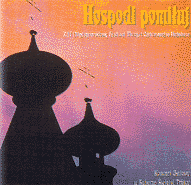FESTIVAL OF THE SINGING SOUL
Mr. Buszko managed to do something grand: he managed to get all of Poland interested in Orthodox Church music. (Krzysztof Penderecki)
History of the Festival ( 1981-1995 )
It all started in 1981, quietly and without much publicity in the small town of Hajnówka. The originator and organizer of the future Festival is Mikołaj Buszko, who, with the aid of two allies he invited: representative of Orthodox Parish in Hajnówka – Fr. Michał Niegierewicz and Fr. Jerzy Szurbak, artistic director of the Orthodox Church Music Ensemble of the Warsaw Chamber Opera, organized that year’s ”Days of Orthodox Church Music” in Hajnówka. Initially, they were intended to take place in January, but fate, or rather „grand politics”, decided that they would need to wait until spring – until May. And that’s how things remained from then on. Could there be a better time to jointly praise the Lord, than during a meeting between the songs of heart and soul?
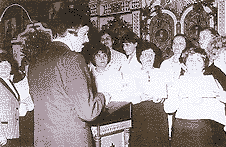 The first Days of Orthodox Church Music – Hajnówka 1982 took place on May 13-16. Nine parish choirs participated – mainly village choirs and authentic folk Orthodox church choirs, painting a picture of songs from Orthodox villages of the Białystok region. The First Days concluded with a performance by a professional Ensemble of Orthodox Church Music of the Warsaw Chamber Opera, under the direction of Fr. Jerzy Szurbak.
The first Days of Orthodox Church Music – Hajnówka 1982 took place on May 13-16. Nine parish choirs participated – mainly village choirs and authentic folk Orthodox church choirs, painting a picture of songs from Orthodox villages of the Białystok region. The First Days concluded with a performance by a professional Ensemble of Orthodox Church Music of the Warsaw Chamber Opera, under the direction of Fr. Jerzy Szurbak.
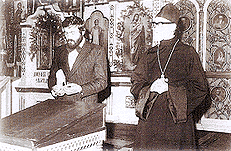 The next year was a breakthrough in the history of the Festival, as it was moved to the newly opened Holy Trinity Cathedral – the temple which is the pride of Hajnówka.
The next year was a breakthrough in the history of the Festival, as it was moved to the newly opened Holy Trinity Cathedral – the temple which is the pride of Hajnówka.
 After over a decade of efforts, late Father Dean Antoni Dziewiatowski, who served as Hajnówka’s Orthodox Parish pastor for over 40 years, obtained the permit to build this temple. The structure was designed by Professor of Architecture Aleksander Grygorowicz. Wall paintings were designed and created by Greek artist Dmitri Andonopulos. This is how the joint creation of a priest, the artists and craftsmen mentioned above, and members of the Orthodox Parish in Hajnówka became the site of the Festival, starting from the 2nd Days of Orthodox Church Music in Hajnówka.
After over a decade of efforts, late Father Dean Antoni Dziewiatowski, who served as Hajnówka’s Orthodox Parish pastor for over 40 years, obtained the permit to build this temple. The structure was designed by Professor of Architecture Aleksander Grygorowicz. Wall paintings were designed and created by Greek artist Dmitri Andonopulos. This is how the joint creation of a priest, the artists and craftsmen mentioned above, and members of the Orthodox Parish in Hajnówka became the site of the Festival, starting from the 2nd Days of Orthodox Church Music in Hajnówka.
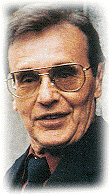 In 1983, the circle of regular Festival organizers was joined by Romuald Twardowski, a composer of pieces that also originated from the Orthodox Church cultural tradition. He became a permanent fixture of the Festival.
In 1983, the circle of regular Festival organizers was joined by Romuald Twardowski, a composer of pieces that also originated from the Orthodox Church cultural tradition. He became a permanent fixture of the Festival.
Starting with the 3rd Days of Orthodox Church Music, the event’s development began picking up pace. The Festival creates its own tradition and its own increasingly diverse and rich formula, accompanying events take place for the first time. Aside from tapestry and folk embroidery exhibitions, the organizers offer for the choirs participating in the competition campfire evenings within Białowieża Forest.
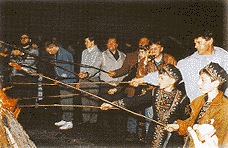
Ten years later, „Music Movement” will write the following in their account of the Festival: „Already numbering among the event’s traditions are its ‚forest echoes’ – every late evening, going into the night, amidst the Białowieża Forest. in the focal glade. meetings would take place over roast sausages, with songs from the same choirs that, a few hours earlier performed in the Holy Trinity Cathedral in front of jurors and an audience several hundred strong. There was no church in the Forest, there was no competition – simply total musical fraternity. The same that once lay at the foundation of the idea of music festivals… „
The 3rd Days of Orthodox Church Music, Hajnówka hosted its first foreign choir – a youth ensemble from Kuovala in Finland, which performed Orthodox church songs in Finnish and Greek. In 1991, the „Days” transformed into the International Festival of Orthodox Church Music, with these young Finns serving as this change’s first heralds. But the name change only symbolically expressed what really took place in Hajnówka, where modest gatherings of parish choirs transformed into a grand international event at a high artistic level. And, most importantly, despite this growth, the event has not lost its character as a musical feast, a musical fraternity, and a non-commercial encounter with the music of the soul.
When opening the 13th International Festival of Orthodox Church Music, Metropolitan Basil defined the main thrust of this event: „The guiding idea of the Hajnowka Festival, which has transformed from a review of parish choirs into a traditional international event, is to reach the sources of Orthodox Church music and the beginnings of Christianity, cultivated for centuries and then forgotten; the extraction and dissemination of its most beautiful pearls, songs linking heaven and earth, and unifying souls.”
That year, the Festival was attended by the Romeiko Choral Ensemble from Philadelphia, consisting of American Greeks who performed Orthodox Church music created 1,500 years ago. If we add that during the same year we were also able to hear choirs sing Orthodox songs in Old Church Slavonic, Ukrainian, Bulgarian, Finnish, Russian, Belarusian, and even in the Lemko dialect and Swedish, it will become clear that this Festival is the only one of its kind in the world in terms of rank and importance, which cannot be overestimated.
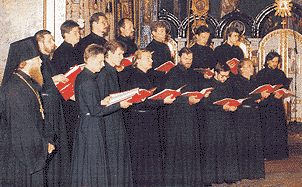 A journalist from the conservative-liberal journal “High Time” reported: „The choir under the direction of the venerable professor Emma Caturian spent seven days traveling by bus from Yerevan to Hajnowka to, for the first time ever in Poland, present the polyphonic Armenian liturgy – Patarag. It presented the full, shimmering tapestry of colors of Southern Caucasus music. No other festival I’ve seen displayed such wonders.” A „National Herald” reporter from New York emphasized that „this is a grand festival, which presents the diversity of songs of the Orthodox Church.” And a reviewer from the Swiss magazine „Kirche – Schweizerische Kirchenzeitung” pointed out that „the Festival is a place where East and West meet. There was no rivalry inside the temple: it was a complete musical fraternity. The same that once lay at the foundation of the idea of music festivals „
A journalist from the conservative-liberal journal “High Time” reported: „The choir under the direction of the venerable professor Emma Caturian spent seven days traveling by bus from Yerevan to Hajnowka to, for the first time ever in Poland, present the polyphonic Armenian liturgy – Patarag. It presented the full, shimmering tapestry of colors of Southern Caucasus music. No other festival I’ve seen displayed such wonders.” A „National Herald” reporter from New York emphasized that „this is a grand festival, which presents the diversity of songs of the Orthodox Church.” And a reviewer from the Swiss magazine „Kirche – Schweizerische Kirchenzeitung” pointed out that „the Festival is a place where East and West meet. There was no rivalry inside the temple: it was a complete musical fraternity. The same that once lay at the foundation of the idea of music festivals „
Another aspect was emphasized by „Kurier Podlaski”: „A thousand years ago, Prince Vladimir of Kiev dispatched his representatives to determine which religion would fit Russia the best. After they returned, they stated that only when listening to Orthodox Church songs during a service at the Hagia Sophia in Constantinople, were they unable to tell whether they were Heaven or on earth. A similar sentiment may be common to both Polish and foreign tourists who, every May, arrive in Hajnowka in large numbers to participate in the only event of this type – the Festival of Orthodox Church Music”
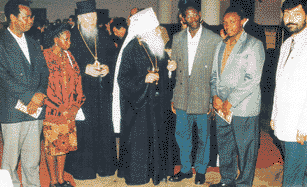 When reading such opinions, Mikołaj Buszko, the Festival’s creator and director, can feel proud. Because he may be the only one who knows just how much work and effort it took to create an event that achieved such scope.
When reading such opinions, Mikołaj Buszko, the Festival’s creator and director, can feel proud. Because he may be the only one who knows just how much work and effort it took to create an event that achieved such scope.
Which did not occur without its own share of problems, of course. However, even during this challenging time for both culture and the Festival, no one in Hajnówka was sitting on their hands. Despite the obstacles and problems the organizers had to deal with, the Festival has not been postponed for a year. Director Buszko’s reply to the offer to organize a biennial of Orthodox Church music instead of annual meetings was as follows: „The Festival could be organized every two years, then every three or four. But I ask: why? Who does this benefit? This would only „dilute” the event, and we should remember, that the Festival does not just encompass a single week of May, it spans the whole year. First and foremost, it should become a focal point for the musical promotion of Orthodox culture”.
Here, it should be mentioned that, starting with the 4th Days of Orthodox Church Music (1985), all festival concerts have been phonographically recorded with a cassette containing the recordings of previous day’s performances already available the following morning. Ten years later, CDs with the best recordings of the last Festival became available, inaugurated by the CD „Lord have mercy” (“Hospodi pomiluy”) from the 13th Festival of Orthodox Church Music – Hajnówka ’94.
The Festival’s formula anticipates that, in the course of its week, contest auditions, seminars, exhibitions, and accompanying concerts take place in other churches and cities. (with a recent „subfestival” in the Orthodox Church of the Holy Spirit in Bialystok). Every year the Festival hosts over a thousand singers from over thirty choirs not just from Europe. The Festival has built a well-deserved reputation. There is a lengthy queue of those willing to sing within the walls of the Hajnowka Cathedral. Some choirs, including those from abroad, have to wait a few years for an invitation to Hajnowka. The Festival’s formula includes a framework within which choirs are evaluated according to several categories:
1. rural parish choirs,
2. city parish choirs,
3. other parish choirs,
4. amateur secular choirs,
5. professional secular choirs.
Here is how Paris’s „Culture” described the organizational team operating from the Hajnowka House of Culture under the direction of Mikołaj Buszko:
„-Thanks to people like Irena Parfieniuk, Sławomir Kaliszuk, Rościsław Kuncewicz, or Halina Wojskowicz – because they, and not institutions, organize the Festival – with the help of dozens of social activists, Orthodox Church Brotherhood youth, the International Festival of Orthodox Church Music in Hajnówka runs smoothly year after year.
„- I bow to these people,” Father Sergey Bieschasny from Moscow the co-organizer of major events, including the World Congress of the Brotherhood of the Orthodox Youth Syndesmos, said in 1995.. – In our Russia it would be impossible for such a significant cultural phenomenon to survive out in the provinces. I know how much money, organizational efforts, willpower and, above all, enthusiasm is needed to organize a festival in the countryside. Only a portion of this work is visible here – but how much of it remains hidden? You need to send a letter, make a call, have a talk, dispatch a bus, greet, feed, put to bed… „
The conductors of the choirs coming here say:
– Festival Days in Hajnówka are like a small Passover for us (Sławomir Jurczuk)
– For conductors, Hajnówka is a new experience, a learning opportunity (Eugeniusz Skowroński)
– The Festival has raised the level of singing in many Orthodox churches (Fr. Bazyli Dubec)
– The Festival in Hajnówka is a great motivator for choristers, it is the fruit of a year of our labors (Dymitr Tichoniuk)
What does the Festival mean to Hajnówka itself?
– This is our window to the world. Beforehand, we knew almost nothing about Orthodoxy abroad. Now, we know a lot and the world is finding out about us as well. (Mikołaj Demianiuk).
– In Hajnówka, no parish choir is allowed to have an off day. Even old ladies will point out that something sounds wrong. (Tomasz Danilecki „Gazeta Wyborcza”).
– We treat the Festival in our town as a great celebration and a type of manifestation. It is a manifestation of the superiority of cultural values over our materialistic everyday life, in which a person all too often becomes the object of violence and destructive actions. We, worn down by information about rape, crime, or war, become burdened with fear, which is the killer of hope/ And that is why here, in Hajnówka, we want to show the superiority of art and spirit over destructive actions. This Festival has a deep humanistic, theological, educational and pastoral message that’s intended for everyone. (Jadwiga Rudzińska – Patejuk, Mayor of Hajnowka).
In 1995, Polish Ministry of Culture declared the International Festival of Orthodox Church Music in Hajnówka as an artistic event of the highest rank, awarding it the „zero category”, thus placing the Festival on the same level with such prestigious events as the Chopin Competition and the „Warsaw Autumn” International Festival of Contemporary Music, which are the most renowned Polish music events internationally.
Festival ( 1996 – 2000 )
– I grant the patriarch’s blessing to the honorable members of the organizational committee of the 15th International Festival of Orthodox Church Music and to all choirs. I wish for peace and joy from God to the beloved children in Christ. Best regards to all of you. May the Festival serve the glory of our Orthodox faith. Your initiative popularizes byzantine music and displays the unity of the Orthodox Church in singing and in praising God. Orthodox Church music is an expression of Orthodox culture. Through such piety, it brings many Orthodox nations closer serving to jointly praise and glorify the Holy Trinity of God.
This blessing was sent to Hajnówka in 1996 by Bartholomew I, Patriarch of Constantinople, to commemorate the jubilee 15th edition of the Festival
The rapprochement of nations through music, through a sung prayer – emphasized by Patriarch Bartholomew, head of the Church in the metropolis of former Byzantium, the cradle of Orthodoxy – was and is a very important feature of the Hajnowka Festival.
In the same jubilee year, the 15th IFOCM hosted its first ensemble from Africa, now enriching the performances of previous guests from the European, Asian and American continents by elements of African culture. It was a trio of singers from Kenya, who presented several religious and paraliturgical songs in their national language, accompanied by elements of national dances. The singers performed in the Cathedral. – They probably had the largest audience among all choirs performing here. – „Festival Newspaper” wrote.
Spontaneous and dynamic, full of vigor, joy and African expression, the Kenyans’ performance in a way shocked European listeners of lyrical and dignified Orthodox singing that they have been exposed to so far. It was a shock full of joy and energy.
One of this group’s members, Peter Kariuki, singer of the Orthodox Parish Choir of Annunciation of the Blessed Virgin Mary in Ngecha (Kenya), said: – We sing Orthodox Church songs related to our African culture. Ngecha lies 20 km from Nairobi, the capital of Kenya. Our town has 20 thousand inhabitants and six Orthodox churches. My parish has 350 parishioners, of which around 20 people sing in the choir. We sing in the local language and enhance the singing with theatrics. Performing in Hajnówka was a great experience for me.
It was also an unforgettable experience for the festival listeners, because how much have we known about African Orthodox Church music before then?
Every year, Hajnówka would learn something new about the world of Orthodoxy. Every year, the world also learned something new about the Orthodox Church music of other nations and about Poland. Of significance here may be the words of father Andrzej, patron of the Orthodox Parish Choir of Transfiguration in Moshna (Cherkasy province in Ukraine), which won the first prize in the category of village choirs in 1995: – Where are you taking the parish choir? Poland has nothing but Catholics – we were warned before departure. The encounter with Orthodoxy in Hajnówka was a great, positive shock for me. We knew nothing about Orthodoxy in Poland …
And all of Festival’s observers were increasingly raising their voices about how this event, which was born in a Polish province, is a significant artistic phenomenon on a global scale …
Exactly so … a significant artistic phenomenon and a link between cultures. A grand, joint prayer of Orthodox Christians and a great artistic experience for listeners of different faiths …
Fifteen years ago, following the First Days of Orthodox Church Music in Hajnówka, it was said that this is the world’s first festival of this kind of music. After the 15th IFOCM, it was also said that „Hajnówka” is the world’s largest festival of Orthodox Church music, bringing in more than a thousand singers from several continents. The largest and most artistically significant.
Having served as the Festival’s juror for several years, in Hajnówka I was given the opportunity – and I say this as a music critic and observer of cultural life – to experience encounters with music on the highest artistic level, and to experience and reward astounding and heartwarming surprises.
The biggest of them was meeting with what, at the time, was likely the best large choir in Europe: the State Choir of Belarus Radio and Television under the direction of professor Viktor Rovdo (winner of the Grand Prix Award of the 15th IFOCM), who a year later presented his second choir: Students’ Choir of the Conducting Department of the Belarusian Music Academy in Minsk (awarded with the Grand Prix of the 16th IFOCM „Hajnówka ’97”). This choir – in accordance with festival tradition – performed (under the baton of Viktor Rovdo) the following year during the inaugural concert of the 17th IFOCM as last year’s grand prize winner. Following that concert, the chairman of the jury, Romuald Twardowski publicly stated what listeners in many countries have felt for years:
As for the interpretations by a professor whom I have known since 1950 (I was his student and sang in the choir he led), they are brilliant. I state this with all possible firmness and openness: Professor Viktor Rovdo is the most outstanding interpreter of choral music of the 20th century. May God grant him as many years of life and creative activity as possible.
Other choirs, the winners of the festival’s main awards in both professional and amateur choir categories also performed at the highest, world-class artistic level. These included „Kiev” Chamber Choir from Ukraine (1996) – ex aequo with the Belarusian State Choir of Radio and Television, the Sveshnikov’s State Academic Russian Choir from Moscow (1998), „Svetilen” Men’s Choir of the Monastery of St. Dmitry Donskoy in Rostov (Russia) and „Credo” Choir of the Orthodox Metropolis from Chisinau (Moldova) – both in 1999, „Zumoro” Choir of the Orthodox Theological Seminary in Kottayam from India, “Orphei” Men’s Choir of the State University in Lviv in Ukraine, or – to us, exotic in their vocal art – a choir of the Orthodox parish of St. Nicholas in Seoul (South Korea) – all three in 2000, and a year later, during the jubilee 20th IFOCM „Hajnówka 2001” two wonderful academic choirs: Mixed Choir of the Academy and Theological Seminary in St. Petersburg (Russia) and, likely the best in Poland at this moment – the Academic Choir of the Silesian University of Technology in Gliwice.
In addition to the invariably high artistic level of festival presentations, Hajnowka has become the main promoter of Orthodox Church music in areas that extend beyond the circle of the faithful of the Orthodox Church, and even beyond the circle of temples not only Orthodox, but also Catholic or Evangelical – a promoter in the broadly understood circle of cultural music within secular concert halls.
Between the 10th and 20th IFOCM, this event was developing increasingly dynamically, extending its reach, along with accompanying concerts, to large cities (Warsaw, Krakow, Gdańsk, Białystok and Gliwice) as well as towns (e.g. Drohiczyn, Chełm or Wołomin), and villages on the so-called eastern wall (Podlasie, Lubelszczyzna). Following competition concerts in Hajnówka (recorded each year on cassette tapes and compact discs – „prolonging” the life of these concerts and constituting years of documentary evidence of the Festival’s artistic achievements), the Festival’s guests would perform in Catholic, Protestant and Orthodox churches in many regions of the country, and also in secular concert halls.
No Polish music festival has ever recorded such territorial, concert and discographic expansion. I have not heard of any other European festival, that would present its music in so many and such diverse places at the same time. Therefore, it can be said without exaggeration, that the International Festival of Orthodox Church Music in Hajnówka – apart from its undeniable artistic and religious value - is also a kind of organizational phenomenon, presenting an original, self-made formula for popularizing of Orthodox music culture.
Festival ( 2001 – 2019 )
In the meantime, the Festival is in a difficult position behind the scenes. A struggle for the event’s existence in its previous form begins and will last for several years. The Festival’s opponents harshly criticize the direction of the Festival’s development, its repertoire and cultural openness. The first clear signs of antipathy appear as early as 1998 (the 17th edition of the IFOCM), following local elections and personnel changes in Hajnówka’s government, and the assumption of the metropolitan position by Sawa – current archbishop of the Białystok-Gdańsk diocese, and priest Michał Niegierewicz becoming the presbyter of the Holy Trinity Cathedral in Hajnówka.
Countering the attacks, director Mikołaj Buszko makes statement in the press: „The Festival never aspired to become a liturgical event. It has been a secular event since the start. In addition to spiritual values, we also wanted to bring out the artistic values of Orthodox Church music and to introduce it to the broader public. The Festival’s performers are a unique blend of cultures and nationalities.” As if echoing these words, participants of the 17th and subsequent editions are extremely diverse. Among others, Hajnowka welcomes performers from Egypt, Estonia, Bulgaria, Germany, Belarus, Russia, Ukraine, Romania, Macedonia, Latvia.
Hajnówka authorities’ and the parish community’s attempts to take away the Festival’s independence are unsuccessful. The organizers consistently stick to the event’s proven formula, praised by both the choristers arriving for auditions and the broader music world. In 2000, the Festival receives strong external support. Starting with the 19th edition, the presidents of Poland have served as the event’s honorary patrons.
The 21st International Festival of Orthodox Church Music – Hajnówka (2002) proceeds in a tense atmosphere. Its opponents make another attempt to subordinate the event, and upon encountering resistance from the organizers, they ban the Festival from the Holy Trinity Cathedral. Out of necessity, the Festival’s opening by „Svetilen” Men’s Choir of Saint Dmitry Donskoy Monastery in Rostov on Don conducted by Sergey Pivovarov, the competition auditions, and the concert dedicated to the 40th anniversary of Fr. Jerzy Szurbak’s artistic work and the 30th anniversary of his famous Orthodox Church Music Ensemble take place in the Column Hall of Hajnówka’s House of Culture.
The jury’s line-up expands by yet another outstanding personality from the music world, Ukrainian composer Lesya Dychko – the first in Ukraine’s post-revolutionary history to compose Orthodox Church music. Choirs also perform in the Branicki Palace in Bialystok, while the Gala Concert, as is tradition, takes place in the Bialystok Philharmonic. The forced change of location allows for the inclusion of instrumental-vocal music in the repertoire, which cannot be performed inside a church. The organizers also preserve the Festival’s current formula of being open to all beliefs.
In subsequent years, the Festival’s development gains even greater momentum – it expands its reach to more cities in Poland, attracts performers from the farthest corners of the world, and enriches its repertoire by previously unknown, invaluable compositions. The festival audience applauds not only religious classic literature, but also modern compositions. Often these are performances and premieres of world-class stars from the circles of classical music.
In 2003, the 22nd International Festival of Orthodox Music – Hajnówka moves to Białystok in its entirety. Competition auditions and concerts with participation from 20 choirs from 14 countries around the world, take place in the Białystok Philharmonic and the Branicki Palace. The organizers receive unusual correspondence: a congratulatory letter and a blessing sent by the Patriarch of Constantinople Bartholomew. The Festival’s inaugural concert has a unique character: it is dedicated to the 70th birthday of prominent Polish composer Krzysztof Penderecki. The Chamber Choir of the Moscow Conservatory under the baton of the maestro himself performs his „Song of Cherubs”. The concert’s program also includes „Hymn to Saint Daniel”, performed by the Chamber Choir of Moscow Conservatory, Polish Chamber Choir „Schola Cantorum Gedanensis” and the Białystok Philharmonic Orchestra conducted by Marcin Nałęcz-Niesiołowski. At the organizers’ request, Krzysztof Penderecki agrees to take the Festival under his Artistic Patronage, which he holds from 2003 until his death in 2020.
Later, Penderecki’s music will be presented at the Festival many times (including premiere performances). The organizers consider the performance during the 25th Festival of Penderecki’s „Matins”, song inspired by Orthodox Church music, to be their greatest success. In 2006, the „Orthodox Church Music” Foundation leads to the piece having two premieres – Polish in the Archcathedral Basilica in Bialystok and Russian in the Smolny Cathedral in Saint Petersburg. The author of the songs attended both performances.
The Festival also hosts premiere performances of songs composed by contemporary authors upon special request of the „Orthodox Church Music” Foundation or of director Mikołaj Buszko. The 32nd Festival in 2013 opens with a concert „To Krzysztof Penderecki – from modern composers”. Songs by composers from Belarus, Macedonia, Moldova, Poland, Russia and Ukraine dedicated to the master have their premieres in his presence, as he celebrates his 80th birthday. For the first time, the audience can also listen to the Orthodox version of his Psalm 130 from „Seven Gates of Jerusalem” and Psalm 129 – „De profundis” specially prepared for this ceremony by the composer.
Thanks to Festival, the world’s collection of modern sacral music inspired by the Orthodoxy is enriched by many invaluable pieces. One group is consists of songs discovered by performers and musicologists in various archives, the other consists of modern compositions created „under the influence” of old Orthodox Church music or even commissioned by the organizers. It was during the Hajnówka Festival that the audience was able to hear the premiere renditions of unknown pieces of Orthodox Church music composed by famous Polish composers, such as Stanisław Moniuszko or Karol Szymanowski, as well as by ones completely forgotten. Festival archives contain recently discovered scores of Orthodox Church music of Konstanty Antoni Gorski, Ludomir Michał Rogowski and Józef Kozłowski. The 28th Festival saw the Polish premiere of the song „Seeing me silent”, an Orthodox funeral song for a mixed choir by the Polish composer K. A. Gorski (1859-1924). Grzegorz Seroczyński, Consul General of the Republic of Poland in Kharkov, Ukraine was the one to happen upon the trail of this forgotten piece.
The program of the Festival of Orthodox Church Music also contains pieces by classical music composers whose popularity matches that of pop music stars. Sir John Tavener and Arvo Pärt played the part of main character of some concerts, contemporary composers widely adored by more than just music lovers. They both composed many works, that are deeply rooted in the spirituality of Orthodoxy. Festival – Hajnówka is the only festival in Poland where all of Tavener’s Orthodox Church music works have been performed in their entirety. It is worth mentioning that the concert music of the English composer, like Penderecki’s music, was used in many films, including „The Tree of Life” by Terence Malick. (Whereas fragments of Penderecki’s music accompanied powerful scenes in Kubrick’s „Shining”).
In 2004, during the 23rd edition of the Festival, an author’s concert of the English composer John Tavener took place to commemorate his 60th birthday. Tavener could not attend the Festival, but he personally consented to the musical presentation of his songs. The program included both his a cappella compositions and the work for choir and cello „Holy God”, performed by the Chamber Choir of the Tchaikovsky Moscow Conservatory conducted by prof. Boris Tevlin and cellist Yevgeny Rumyantsev. This song was later included on a post-Festival album published by the „Orthodox Church Music” Foundation. Ten years later and one year after death of John Tavener, fragments of his „Liturgy of St. John Chrysostom” were performed during the 33rd Festival. Thanks to festival presentations, the public also had the opportunity to encounter the works of Arvo Pärt. The Festival’s 29th edition (2010), which took place on the Estonian composer’s 75th birthday, recalled his famous „Penance Canon”.
The 34th Festival (2015) opened with a concert dedicated to the 85th birthday of composer Romuald Twardowski, a person inalienably tied to the Festival (a „cult” personality, as younger audience members would say) who had supported the organizers with his erudition and authority and served as the long-time chairman of the festival jury. The concert „Orthodox Church music – from origins to modernity” included both the jubilee’s pieces, among them a premiere „God, in Thy Name”, as well as compositions dedicated to him by Lesya Dychko (Ukraine), Anatoliy Kisielov (Russia) and Vladimir Cholak (Moldova). Twenty-three choirs from a number of European and Asian countries competed in the contest performances. Accompanying concerts took place in Krzysztof Penderecki’s European Music Center in Lusławice, among other locations. The Choral Conducting Unit of the Instrument-Pedagogic Department of Frederick Chopin Music University in Białystok, along with the „Orthodox Church Music” Foundation organized the International Scientific Conference „Orthodox Church Music – Traditions and Present”, which was attended by composers, conductors and musicologists visiting the Festival. As every year, students of conducting of the Bialystok University of Music had the opportunity to take part in the Master Class. Father Jerzy Szurbak led the workshops on performance practices of Eastern Slavic religious music. (Each subsequent Master Class session has a different leading topic.)
In accordance with the principle practiced by the organizers, the event becomes more open to various environments and faiths with each passing year. Choirs representing not only Orthodox believers, but also Catholics, Greek Catholics, Old Believers and secular folk participate in the competition auditions. It’s small wonder that the jubilee 35th Festival (2016) saw a record number of participants – 33 choirs from 16 countries, including Australia, Estonia, Greece, Macedonia, Romania, Serbia, Hungary and the United Arab Emirates. Father Ivan Moody sits on the jury – an English composer, conductor and musicologist, an Orthodox priest currently living in Lisbon (Portugal), and a student of John Tavener. The gala concert with performances by stars of several previous festivals (grand prize winners) concluded with a performance by the winner of the first prize in the category of professional choirs, the State Russian Choir conducted by prof. Vladimir Minin. The Festival was accompanied by concerts in, among others, Michałowo and Supraśl, dedicated to the memory of artists associated with Podlasie – to Tamara Sołoniewicz, a director of documentary films who had filmed the Festival several times and Wiktor Wołkow, a photographer and a friend of the Festival.
In the following year 2017, 26 choirs enter the competition. The „Orthodox Church Music” Foundation organizes a record number of 21 accompanying concerts in large and small cities across Poland. The festival public not only listens to music, but also has the opportunity to watch the premiere of the film „Romuald Twardowski. Composer in the mirror of music” (scripted and directed by the composer’s wife, Alicja Twardowska) and meet with father Jerzy Szurbak during the promotion of a publication devoted to him: „Life filled with sung prayer”.
In 2018, the 37th Festival opens with the concert „Polish Commonwealth’s Spirituality in Orthodox Church Music” performed by „Khreshchatyk” Academic Chamber Choir from Kiev, conducted by Pavlo Struts. To commemorate another jubilee of Krzysztof Penderecki, the inauguration concert includes the Orthodox version of Psalm 130 from the oratory of „Seven Gates of Jerusalem” (mentioned earlier). From the initiative and by request of Mikołaj Buszko, an incredible show of choral mastery takes place during the Festival’s closing gala concert. After a short rehearsal of previously submitted sheet music, four choirs (two from Ukraine and one from Lithuania and Russia) under the direction of Ukrainian conductor Alexei Shamrytski perform Penderecki’s „Cherubic song”. There are 30 choirs competing in the auditions. „St. Kyrel” Coptic Choir arrives at the Festival from Great Britain’s capital, while the faraway Lebanon sends the „Theotokos” Orthodox Choir.
For the first time ever, the event opens with the Festival new music signal composed by Romuald Twardowski on the organizers; request. Three new CDs are published by the „Orthodox Church Music” Foundation: „Orthodox Christmas Concerts”, „Orthodox Church Music by Krzysztof Penderecki” (songs pefrormed during the Festival) and ” Fervant Protectress” (Zastupnice usierdnaja).
The 38th Festival (2019) opens with the concert „Masterpieces of European Orthodox Church Music” performed by the State Transnistrian Choir from Tiraspol in Moldova under the direction of Tatiana Tverdohleb. The choristers’ performances include „Lord’s prayer” set to Stanisław Moniuszko’s music (to accent the Year of Moniuszko declared by the Sejm of Poland), as well as the song by the Festival’s jury chairman, Romuald Twardowski, „In Thy Kingdom” („Wo Carstwii Twojem”). The audience of the gala concert warmly applauds the performance of „Harmonious” Choir from Accra in Ghana, led by James Varrick Armaah (the jury awards the choir third place in the category of professional choirs and presents it with a special diploma for propagating Orthodox Church music in Africa). The inaugural and gala concerts are made available through live Internet broadcast. For the first time, the festival folder is published not just in Polish, but also in English.
25 choirs from 11 countries across Europe, Asia and Africa take part in the competition auditions. As every year, the invited choirs perform dozens of accompanying concerts in select cities across the country. One of the most awaited events of the 38th edition is the premiere of the documentary „Festival of the singing soul” directed by Mikołaj Wawrzeniuk. The documentary presents the Festival’s 37-year history as told by its participants – both people at the centre of the events and ordinary observers.
In September 2019, at the Podlasie Opera and Philharmonic in Białystok, the Foundation of the Polish Promotional Emblem „Teraz Polska” in recognition of the achievements for unity by promoting diversity honored the Festival with the title of Promoter of Poland.
The strength of the Festival – Hajnówka lies not just in the amazing, spiritual and artistic richness of the repertoire, but also in the incredible determination of its organizers, for whom nothing is impossible. They were able to surround themselves with both dedicated music lovers and unquestioned musical authorities – true erudites with connections … This network of artistic connections and the extensive knowledge available to personalities associated with the Festival (above all, Prof. Romuald Twardowski and Father Jerzy Szurbak who represent inseparable value and support to the Festival almost since the very start) and other composers, conductors, music critics of the jury, who regularly or rotationally take on the role of the Festival’s consultants … All of which has a direct impact on the Festival’s quality.
The coronavirus, which (officially) appeared in our country on March 4, 2020, locked the Festival in home isolation, like it did with all Polish citizens. The covid-19 pandemic has spread across the world, making it impossible to organize the 39th edition of the Festival on the previously announced date in May. The organizers were forced to postpone this year’s event. The new date of the international meeting of choristers from around the world was set for September 16-20 2020.
Texts: Festival’s History (1981 – 1995), Festival (1996 – 2000) – Wacław Panek
Text: Festival (2001 – 2019) – Olga Pacewicz


